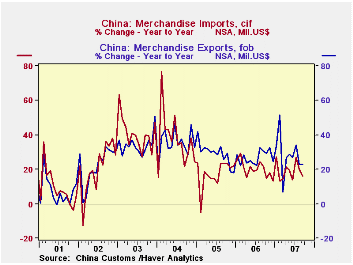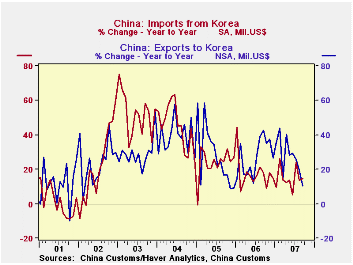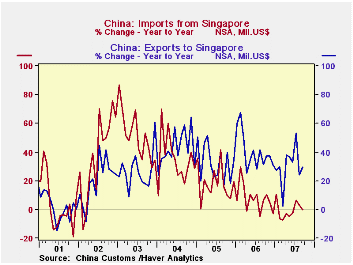 Global| Oct 22 2007
Global| Oct 22 2007ĀAre China's Imports Becoming aĀ Problem?ĀĀ
Summary
While China's balance of trade on goods has risen steadily, it has been the rise in exports that has captured most attention. Now attention is beginning to the paid to the deceleration in imports that has begun to take place in the [...]

While China's balance of trade on goods has risen steadily, it has been the rise in exports that has captured most attention. Now attention is beginning to the paid to the deceleration in imports that has begun to take place in the last year or so. The year to year monthly increase in imports had generally been greater than that of exports, but in the last year or so, this relationship has been reversed as can be seen in the first chart that shows the year to year increases in exports and imports.
A rise in the yuan could account for some of the recent dampening of imports, but the rise of the yuan so far has been minimal suggesting that other factors may be at work. While outsourcing on the part of the western industrialized countries has led to an increase in China's exports, in the initial stage of the process it raised China's demand for intermediate goods which it had to import. As China increased the sophistication of its own production, the need to import intermediate good diminished and resulted in a growing trade surplus with most western countries. It appears that this process is now taking place with some of the Asian countries, such as South Korea and Singapore that have outsourced production to China. These countries are now experiencing a decline in demand from China for intermediate goods. China's imports from Singapore have very definitely leveled off and those from Korea, somewhat less so. China's exports to Singapore and Korea meanwhile, continue to increase with the result that China's surplus on trade in goods with Singapore has widened and China's deficit on trade with Korea has narrowed. These trends are shown in the second and third charts.

| CHINA'S TRADE Y/Y % CHG. | Sep 07 | Aug 07 | Jul 07 | Jun 07 | May 07 | 2006 | 2005 | 2004 | 2003 |
|---|---|---|---|---|---|---|---|---|---|
| Exports | 22.8 | 22.7 | 34.2 | 27.0 | 28.7 | 27.2 | 28.4 | 35.9 | 34.6 |
| Imports | 16.1 | 20.1 | 26.9 | 14.2 | 19.1 | 19.9 | 17.6 | 36.0 | 40.0 |
| Imports from Singapore | -0.2 | 3.3 | 6.7 | -2.4 | -4.7 | 6.9 | 18.1 | 33.5 | 48.6 |
| Imports from South Korea | 14.7 | 14.6 | 23.8 | 5.6 | 13.4 | 16.8 | 23.7 | 44.0 | 51.0 |
| Exports to Singapore | 29.8 | 24.0 | 53.3 | 33.0 | 36.0 | 38.7 | 31.7 | 43.1 | 27.3 |
| Exports to South Korea | 10.28 | 19.9 | 25.8 | 29.2 | 28.2 | 26.9 | 26.3 | 38.3 | 29.6 |
More Economy in Brief
 Global| Feb 05 2026
Global| Feb 05 2026Charts of the Week: Balanced Policy, Resilient Data and AI Narratives
by:Andrew Cates





